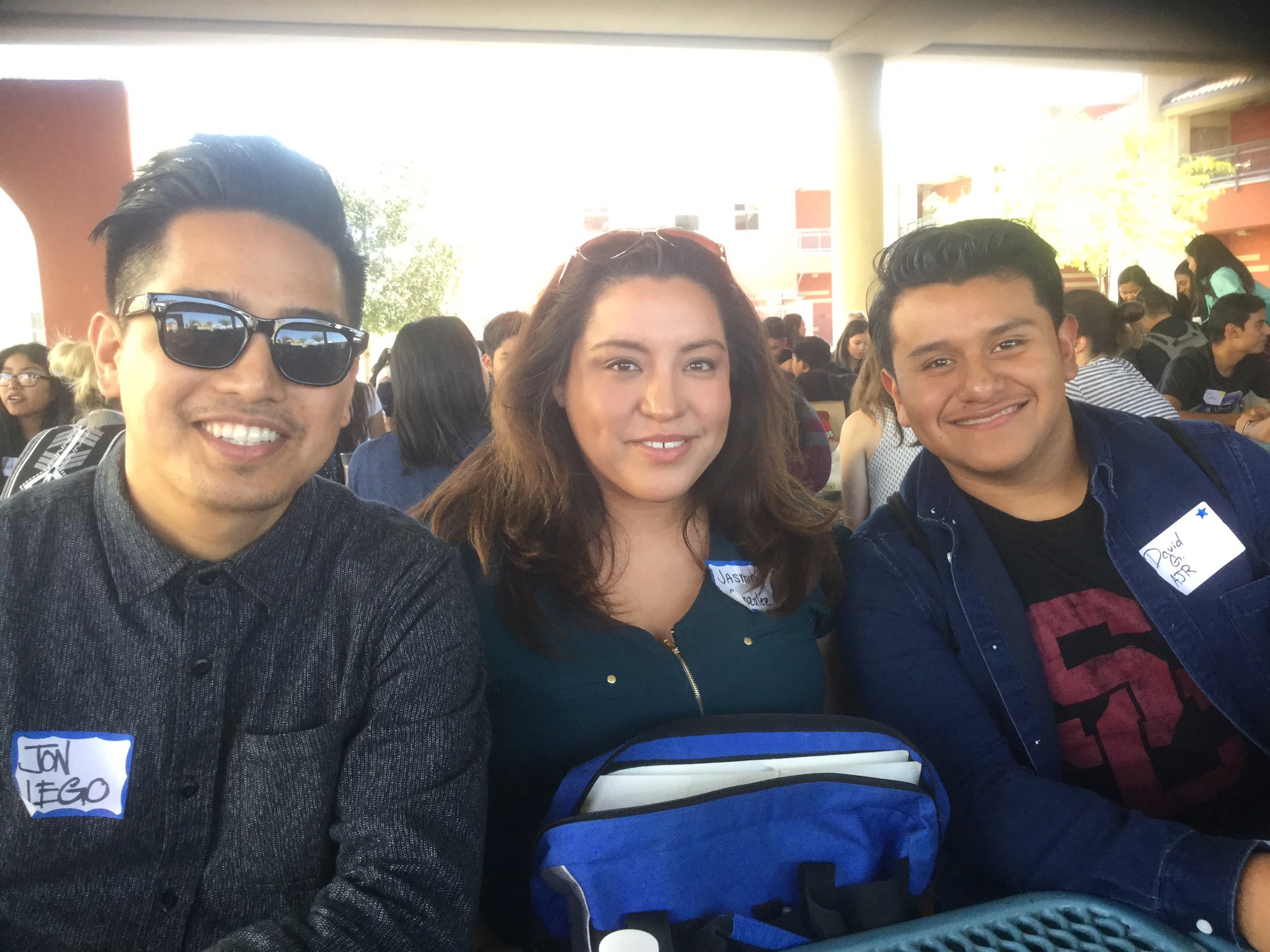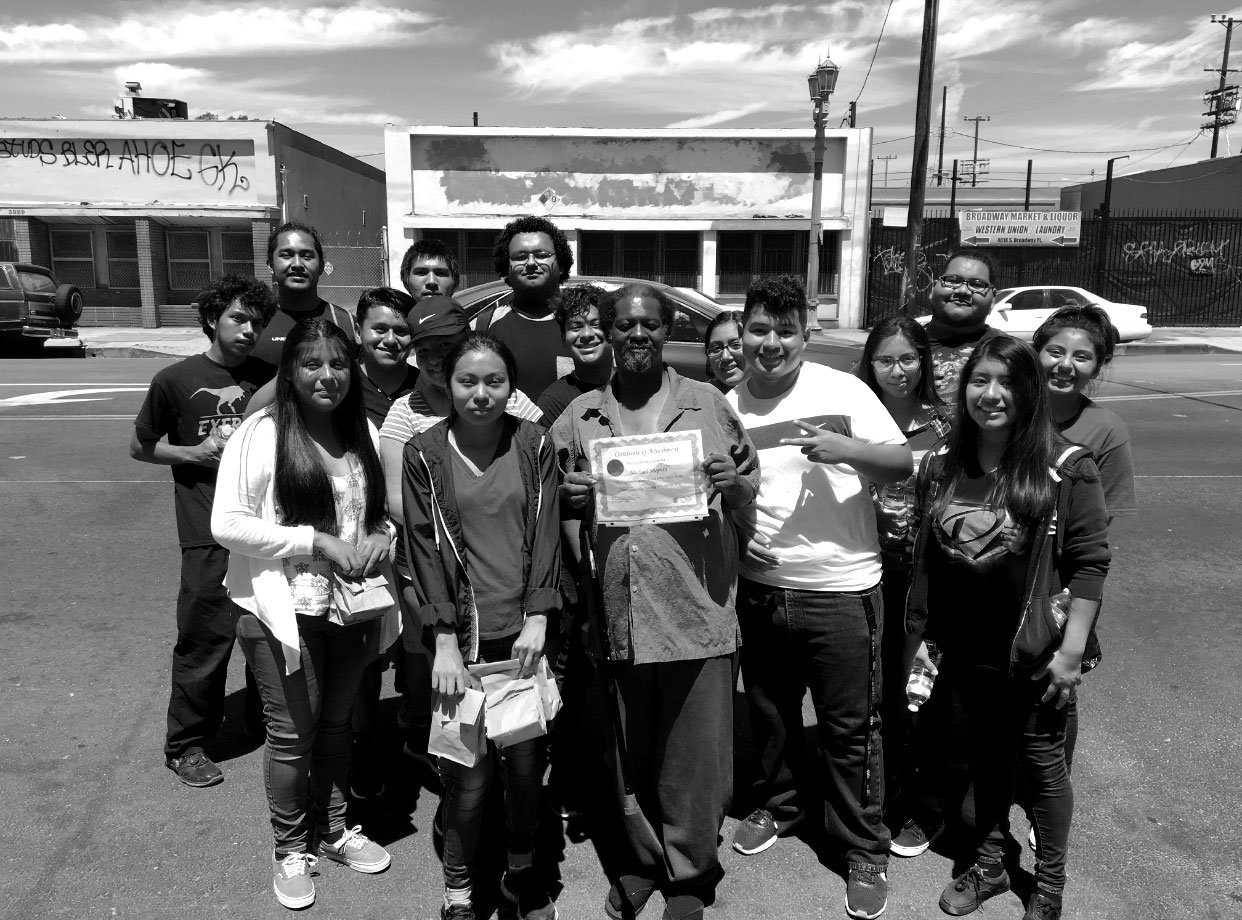Green Dot Alumnus ‘Never Thought About College’ Now Excelling at Georgetown

“To be completely honest with you, I never really thought about going to college,” recalled David Gomez, Ánimo Jackie Robinson Charter High School (AJR) alumnus. Despite the rigorous college preparatory curriculum he experienced at AJR, Gomez couldn’t imagine himself in college, let alone fathom he’d be studying international politics at a top-flight school like Georgetown University.
It wasn’t that he didn’t see the value in higher education, but in 2007, his family was impacted by the financial crisis that would lead to countless others losing their homes in foreclosure. “During my early years in high school, my family was facing very difficult times. We were so close to losing our home,” said Gomez. “Inevitably, I saw joining the workforce as the only way I could truly support my family and change our circumstances.”
The Teacher That Changed it All
Though these struggles loomed, something changed in Gomez’s junior year. “That year I realized that I had to do something more, because joining the workforce would only take me so far,” recalled Gomez. That was also the year he established a connection with the social science teacher who would become his mentor, Jasmin Gonzalez. She saw potential in Gomez.

“She encouraged me to join different campus organizations, motivated me to start the Feed the Need Club, and really helped me see college in a new light,” recalled Gomez.
He attributes Gonzalez’s influence to her authenticity and her ability to relate to her students’ struggles. “Because she’s from a similar background as us, she knows what we’re going through, and so her journey felt inspiring and made me think if she can do it, so can I.”
Feeding the Need
The support he received from his family, Ms. Gonzalez, and his school inspired him to the start the Feed the Need Club, a group where students would find ways to address homelessness in their neighborhoods and give back to those in need.
“My family and I had close encounters with homelessness. Luckily we were never homeless, but we were very close,” recalled Gomez. He took those experiences to heart and sought out ways he could help erase some of the negative perceptions society often has about homelessness.
“I felt that if I would’ve ended up homeless, people would’ve likely had a negative perception of me without knowing or caring that I didn’t have a choice in the matter.” Through the club, Gomez was able to make a difference in his neighborhood and, for the first time, witness the impact he was capable of making in the world.
The Feed the Need Club quickly grew and provided an opportunity for students who wanted to volunteer in the community, but often couldn’t because of age requirements.
Together they hosted sandwich drives, hygiene kit drives, clothing drives, and Gomez was even able to find a site that would allow students under 18 to volunteer. “David is so passionate and authentic, he didn’t get involved because it looks good to colleges, because that wasn’t on his radar at the time,” recalled Gonzalez. “He did it because he knew something had to be done.”
“David is so passionate and authentic, he didn’t get involved because it looks good to colleges, because that wasn’t on his radar at the time,”- Jasmin Gonzalez
Gonzalez says it wasn’t just her efforts: “Much of it was his parents–they were there every step of the way, volunteering, even hosting sandwich drives at their home, and supporting David anyway they could.”
Green Dot seeks to foster student civic engagement by providing opportunities for students to contribute to the wellbeing of their school and communities. Each year, seniors at AJR participate in the Senior Social Action Project, which empowers students to select a current local or global social issue, conduct research, and apply thoughtful solutions that will have a positive impact. And despite all the positive work Gomez was doing, he knew he was capable of more, and saw the Social Action Project as the perfect opportunity to rise to the challenge.
For his project, Gomez decided to further the work of Feed the Need and bring showers to the homeless individuals in his community. He had learned that the homeless population in his community were consistently ignored and unfairly judged based on their appearance, and he felt this project could help erase that stigma and provide homeless individuals with a sense of comfort. Seeing Gomez’s social conscience and desire to help those around him constantly impressed Gonzalez. “Witnessing David’s transformation and all he was able to accomplish reminds me why I teach,” beams Gonzalez.

First Gomez reached out to the local community for clothes and toiletries donations. The Feed the Need Club helped him create essential hygiene kits that included personal care items and fresh laundered clothes. Gomez also applied for a grant to purchase a water heater to warm the water.
“We would get these huge barrels and fill them up with water at home, and then load a water heater in my dad’s truck to keep the water warm,” said Gomez. Once they found a suitable location they would set up a large tent, and attach a hose to the barrels of warm water to allow individuals to shower in private.
Though the pressures of the project frequently felt overwhelming, Gomez never gave up. Through his tenacity and hard work he left a legacy not only at AJR, but in his community. The Feed the Need Club now has over 40 members and continues Gomez’s work by bringing showers to the homeless community.
College is the Option — Making the Tough Decision
Pursuing a postsecondary degree at Georgetown University was not an easy decision for Gomez or his family, as he would be the first person in his family to attend a four-year University. It’s no secret that there are often additional challenges for first generation students navigating the postsecondary education system.
For Gomez, it was even more complex, as his decision came down to two schools, both many miles away from his home: Georgetown and the University of California at Berkeley. His parents pushed for UC Berkeley as it was closer to home and it would be easier for their youngest child to visit. But despite his parents urging, Gomez’s heart was set on Georgetown. “I felt if I had gone to Berkeley I would’ve had my voice heard, but with the current administration it was more important to have a Latino voice here in Washington D.C., the epicenter of politics,” said Gomez.
He didn’t imagine just how hard it would be to leave home. “It was one the hardest things I’ve ever had to do: I had to say goodbye to my mother at our house because she couldn’t go to the airport with me,” sighed Gomez. “I remember going up the little stairs in our home, looking back and thinking ‘this is it… this is the last time I’m going to see my mom for a while.’”
Although he misses his family, Gomez knows he made the right decision. “I never imagined I’d be at a place like Georgetown. So far it has been really transformative,” reflects Gomez. “Now I want more than to just enter the workforce, because I want to be able to really help my family out financially, more so than I could without a college degree.”
He admits when he arrived at Georgetown, he experienced a bit of culture shock, realizing that this place and its inhabitants were not quite like his neighborhood in Los Angeles. “When I would tell people here that I’m from South Central LA, I’d always get those looks, and many would respond, ‘Like the movie Straight Outta Compton?’“chuckled Gomez.
“They were already leaning towards the notion that everyone from South Central LA is from a gang, on drugs or alcoholics when in reality that is not true.” Gomez is proud to be representing his city and describing it as a place of beauty, whose people are hardworking and good spirited.

He hopes his story inspires more students from his community to pursue college. His advice to students: “Although everyone has different circumstances, think about your future, and apply to college. Although sometimes the pursuit of a higher education may seem too grueling in the moment, it’s so worth it.”

